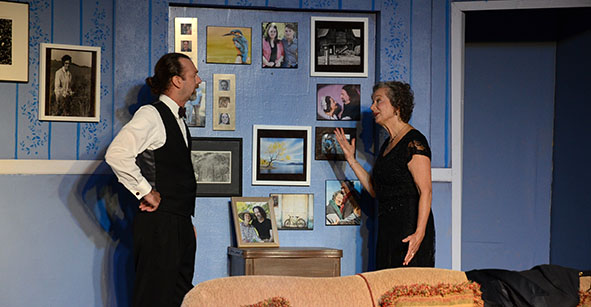
Ken DeZarn and Ann Reynolds grapple with the repercussions of dementia as the leads in David Remschel’s original award-winning play No Room For A Picture On The Blank Wall, now showing at The Point Theater. Photos by Phil Houseal
Sept 12, 2018–Four years ago I watched a family member travel the frustrating journey through dementia. Standing by helplessly as they navigated the confusing, twisting, vexing path made me yearn to understand what the person was experiencing, if only so I could know how to reach them.
David Remschel was the one who let me inside their head. The Fredericksburg resident is not a doctor or a psychologist or a scientist. He is a middle school theater teacher. I was privileged to attend the first public showing in 2015 of his brave original play No Room For A Picture On The Blank Wall. It is now being staged at The Point Theater in Ingram.
Remschel’s unlikely connection with the disease started while working at an Alzheimer’s clinic as part of his Servant Leadership class at McMurray State University.
“That provided so much insight,” Remschel told me after that first show. “I went every day and was able to talk with the patients. That gave me a lot of inspiration, and as I was taking an advanced playwriting class at the same time, it all came together.”
Indeed. His play won the Texas Education Theater Association Playfest Award, and later was published by Dramatic Publishing. This is its first area production since, and the first time directed by Remschel.
The playwright’s challenge was to find a way for the audience to see through the eyes of the patient, Peter Bunther (played by Ken DeZarn). Remschel came up with the clever device of having two wise-cracking movers methodically carry off pieces of the set while the show is in progress, symbolically taking away markers of Bunther’s life. The pair serves as comic relief even as they personify the devastation of the disease.

Providing comic relief while personifying Alzheimer’s, movers Mark Sturm (left) and Jeffery Hensel (right) reassure Ken DeZarn (Peter Bunther) that they know what they are doing.
“They are the Alzheimer’s,” Remschel said of the duo. “They are taking away his life, basically.”
That contrast of the serious and the humorous, evidenced by giggles and nods from the audience, perfectly reflects the conflicted emotions that surround all tragedy.
And those audience reactions are meaningful to Remschel.
“A lot of people have been telling me about their personal experiences with it,” he said. “People who have been affected by Alzheimer’s in their families have told me they were touched by it, and could relate to the characters in the play.”
For some, too much so. One man whose wife had Alzheimer’s had to step out at intermission. But do not get the impression this play is maudlin or depressing. Quite the opposite.
“I don’t want people to go away thinking this is a depressing play,” Remschel said. “I hope they leave thinking about the good memories they have had with people who are afflicted with Alzheimer’s.”
Remschel was always in love with stories, even as a child. If he couldn’t write them down, he drew them. If he couldn’t draw them, he told them.
During his freshman year at Fredericksburg High School he took his first theater class, and discovered a new outlet for his ideas.
“Writing plays is a different kind of writing,” he explained. “In novellas you are able to express so much more mentally. In plays and film, you are not able to do that. It is more of a visual art than a reading art. You can’t see what the characters are thinking.”
He took that challenge as an opportunity.
“I like the idea of people being able to see what I’ve written. That adds another level. It is also pretty complicated. You can’t dwell too much on thought; you have to say what they are thinking.”

Martin Burniston, as Dr. William Fitzgivings, tries to help Ken DeZarn (Peter Bunther) understand his dementia.
This play is unlike any he has done before.
“This is the most different thing I have written,” he said. “I don’t think it is compelling to just have someone get Alzheimer’s, it progresses, then everything is lost. That has been done before. I wanted to add something else to the narrative.”
It was interesting for me to see the show with a three-year interregnum. Remschel confirmed he has done extensive rewriting, tightening the dialogue, making certain characters more sympathetic, and accelerating the dismantling of the set. The result is a quickly moving show that loses none of its original impact.
I seldom use this column to critique or recommend entertainment. But if you are looking for a show that steps outside the usual community theater fare, is riveting storytelling–especially if you know anyone with dementia–while supporting a local, rising playwright, I invite you to spend an evening at No Room For A Picture On The Blank Wall.
So does David Remschel.
“This is a disease that affects so many people,” he said. “It’s a difficult subject, but it just might help find closure.”
Details:
No Room For A Picture On The Blank Wall is being presented indoors at The Point Theater on September 14–22, Fridays & Saturdays at 7:30 PM, Sunday matinee on September 16th at 2:00 PM.
Cast includes: Ken DeZarn, Ann Reynolds, Martin Burniston, Jeffery Hensel, Mark Sturm, Brandon Newton, and Jessica Sturm.
Information at www.hcaf.com
